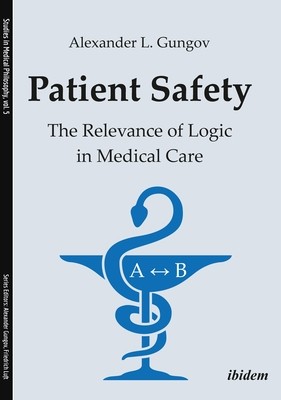
- We will send in 10–14 business days.
- Publisher: Ibidem Press
- ISBN-10: 3838212134
- ISBN-13: 9783838212135
- Format: 14.7 x 20.8 x 1 cm, minkšti viršeliai
- Language: English
- SAVE -10% with code: EXTRA
Patient Safety. The Relevance of Logic in Medical Care (e-book) (used book) | bookbook.eu
Reviews
Description
In our time of well-publicized health care travails, in the USA and the UK and elsewhere, matters of financing too often subsume the dimension of patient care. In his latest book, Alexander L. Gungov studies a vital but neglected aspect of patient safety. Of the thousands of medical errors committed on a daily basis, in the bulk of unfortunate clinical decisions, a significant share pertains to various logical flows and epistemological fallacies. By focusing on the logical dimensions of clinical medicine, Gungov promotes awareness of the logical and epistemological traps that lie in the day-to-day care of patients. Such a focus not only allows us to avoid falling into them, but demonstrates the practical value of looking at medicine from a new philosophical perspective. That perspective involves a broad and unusual collection of philosophers. The discussion takes its starting point from J. S. Mill's inductive methods and Giambattista Vico's verum-factum principle, but then sets out a unique combination of Charles Sanders Peirce's abductive reasoning, Immanuel Kant's reflective judgment, as well as G. W. F. Hegel's and D. P. Verene's speculative thinking, all marshalled to present a novel philosophical account of clinical diagnostics. Interpretation of practical examples elucidate the logical aspect of medical errors and suggests strategies of overcoming them. The book as a whole demonstrates the value of Hans-Georg Gadamer's hermeneutical insights into the enigmatic character of health. This much-needed book will be of interest to medical practitioners, health policy-makers, patients and their families, and to advanced students and scholars in medicine, the medical humanities, medical epistemology, and the philosophy of medicine in general.
EXTRA 10 % discount with code: EXTRA
The promotion ends in 21d.10:41:55
The discount code is valid when purchasing from 10 €. Discounts do not stack.
- Publisher: Ibidem Press
- ISBN-10: 3838212134
- ISBN-13: 9783838212135
- Format: 14.7 x 20.8 x 1 cm, minkšti viršeliai
- Language: English English
In our time of well-publicized health care travails, in the USA and the UK and elsewhere, matters of financing too often subsume the dimension of patient care. In his latest book, Alexander L. Gungov studies a vital but neglected aspect of patient safety. Of the thousands of medical errors committed on a daily basis, in the bulk of unfortunate clinical decisions, a significant share pertains to various logical flows and epistemological fallacies. By focusing on the logical dimensions of clinical medicine, Gungov promotes awareness of the logical and epistemological traps that lie in the day-to-day care of patients. Such a focus not only allows us to avoid falling into them, but demonstrates the practical value of looking at medicine from a new philosophical perspective. That perspective involves a broad and unusual collection of philosophers. The discussion takes its starting point from J. S. Mill's inductive methods and Giambattista Vico's verum-factum principle, but then sets out a unique combination of Charles Sanders Peirce's abductive reasoning, Immanuel Kant's reflective judgment, as well as G. W. F. Hegel's and D. P. Verene's speculative thinking, all marshalled to present a novel philosophical account of clinical diagnostics. Interpretation of practical examples elucidate the logical aspect of medical errors and suggests strategies of overcoming them. The book as a whole demonstrates the value of Hans-Georg Gadamer's hermeneutical insights into the enigmatic character of health. This much-needed book will be of interest to medical practitioners, health policy-makers, patients and their families, and to advanced students and scholars in medicine, the medical humanities, medical epistemology, and the philosophy of medicine in general.


Reviews